Federal Court Rules In Favor Of Transgender Student In Bathroom Access Case
A Federal Court has ruled once again in favor of a transgender student in Virginia who was prevented from using the bathroom conforming to their gender identity.
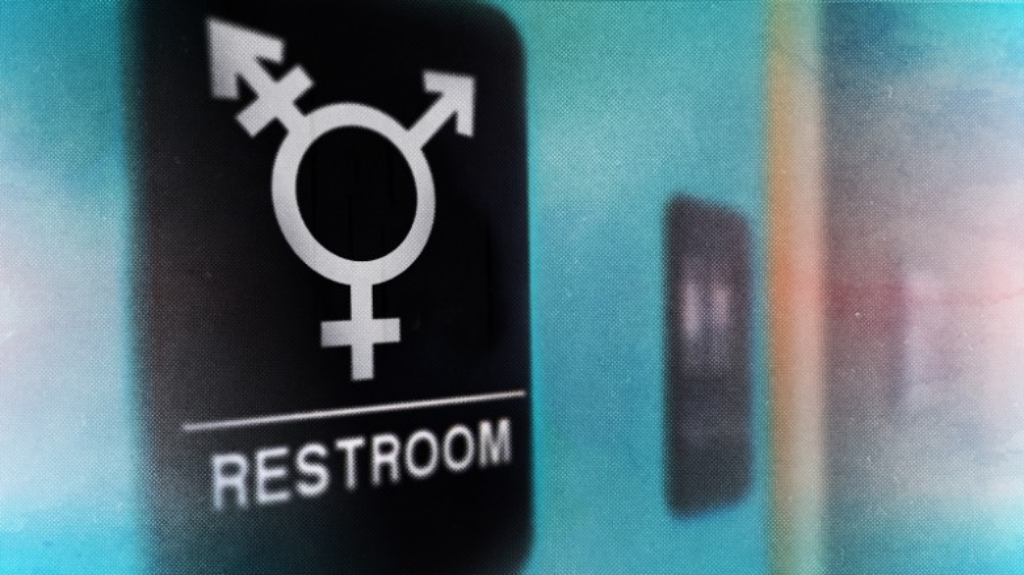
In the latest legal development in a case that has bounced back and forth in the Federal Courts for nearly five years now, a Federal District Court in Virginia has ruled in favor of a former student who sued his school district, finding that the district policy barring transgender students from using the restroom that matches their gender identity violates the law:
A federal judge ruled Friday that a Virginia school district’s policy barring a male transgender student from using the boys’ bathrooms violates the United States Constitution, an important victory for transgender rights advocates in a closely watched case.
In a 28-page ruling, Judge Arenda L. Wright Allen of the United States District Court in Norfolk, Va., said that the school district’s policy violated the rights of Gavin Grimm, a former student.
“There is no question that the board’s policy discriminates against transgender students on the basis of their gender nonconformity,” Judge Wright Allen wrote. “Transgender students are singled out, subjected to discriminatory treatment, and excluded from spaces where similarly situated students are permitted to go.”
School bathroom policies vary, sometimes district by district, across the country. Many in recent years have faced contentious legal challenges over which bathrooms transgender students should be allowed to use. Mr. Grimm’s lawsuit against Gloucester County Public Schools in Virginia is among the best known.
Judge Wright Allen’s ruling echoes those in several other courts that have recently ruled in favor of allowing transgender students to use bathrooms corresponding to the gender they identify with.
Yet nationwide, the question is far from resolved. The Supreme Court earlier this year chose not take up an appeal in a similar case. And it is not clear that the Supreme Court would take up any such cases until there are conflicting opinions in lower appellate courts, according to Joshua Block, Mr. Grimm’s lawyer. To date, there have not been any, he said.
Mr. Grimm, 20, attended Gloucester High School from 2013 to 2017. The Gloucester County school board had maintained that Mr. Grimm’s “biological gender” was female, prohibiting administrators from allowing him to use the boys’ restrooms.
Mr. Grimm, who wrote an essay in The New York Times in June about his experiences growing up, said in an interview that Friday’s ruling was “wonderful.”
“It was certainly a victory for the trans community,” he said.
Mr. Block said the ruling applied only to Mr. Grimm, but it would most likely become “persuasive precedent” in other cases. He said the school district’s policy was still in effect
“If another student is subjected to this discriminatory policy, that student can go to court, and has this decision to point to right away,” said Mr. Block, a senior staff attorney with the American Civil Liberties Union.
“Other school districts in Virginia and around the country have been looking to see what happens with this case.”
A lawyer for Gloucester County Public Schools declined to comment on the decision on Friday.
More from The Washington Post:
The constitutional rights of a transgender student were violated when he was barred from using the boys’ restroom at his Virginia high school, a federal judge ruled Friday.
The student, Gavin Grimm, said the ruling sent the message that “discrimination is not legal in America.” But the 20-year-old, who has graduated from the high school where he was banned from the boys’ restroom, acknowledged that the school system could appeal the decision, and it is “likely that this is not the end.”
“We deserve equal rights,” said Grimm, who is studying in California to be a teacher. “I’m going to be doing what I can to fight.”
Gloucester County School Board Chairman William “Jarret” Lee declined to comment Friday night. The board’s attorney, David P. Corrigan, could not be reached for comment.
But in court last month, attorneys for the Gloucester County School Board argued that gender is not a “societal construct” and that Grimm has not undergone sex reassignment surgery and should not be allowed to use the boys’ restroom.
Grimm sued after the school board in 2014 mandated that students use restrooms aligned with their “biological genders.” He argued that the policy violated the 14th Amendment’s equal-protection clause and Title IX, the law prohibiting discrimination on the basis of sex in schools that receive federal money.
The case ascended to the Supreme Court, which was scheduled to hear it in spring 2017. But the justices returned the case to a lower federal court after the Trump administration reversed Obama-era guidance that directed schools to allow students to use restrooms that aligned with their gender identity.
Last year, Judge Arenda L. Wright Allen declined to dismiss the case from the U.S. District Court for the Eastern District of Virginia. The two sides appeared in Allen’s courtroom last week to argue the case after talks to end the bathroom rule broke down earlier this year.
Allen, who struck down Virginia’s ban on same-sex marriage in 2014, rejected the Gloucester system’s argument that allowing transgender students to use the bathroom matching their gender identities caused privacy concerns for other students.
She found the policy harmed Grimm, who felt “stigmatized and isolated” when he had to use separate restrooms. Grimm avoided using the restroom at school and developed a urinary tract infection and experienced suicidal thoughts.
“The perpetuation of harm to a child stemming from unconstitutional conduct cannot be allowed to stand,” Allen wrote in her decision, which declared that Grimm’s rights were violated “on the day the policy was first issued” and until he left Gloucester High, in the Hampton Roads region.
Grimm’s case has been bouncing through the Federal Court system for several years now, and while it has seen several successes, it has also suffered several setbacks. Grimm first filed his lawsuit against the school board back in June of 2015, alleging in that Complaint that the school had violated his Constitutional rights and his rights under Federal law in denying him access to the bathroom of the gender that he identified with. While he initially lost at the District Court level, the Fourth Circuit Court of Appeals ruled in Grimm’s favor, finding that there was a basis in the law to support Grimm’s claims and that it was inappropriate for the District Court to dismiss the case in the early stage of pleadings as it had done. That ruling was based in large part on guidance that had been issued by the Obama Justice Department and Department of Education in May of 2016. That guidance took the position that the anti-discrimination laws based on gender as set forth in the Civil Rights Act of 1964, which were extended to education in 1972, covered transgender Americans and should be interpreted as saying that these individuals had the right to be treated in accordance with the gender they identify with even when it conflicts with the gender they were given at birth. Based on this argument, the Obama Administration intervened in a lawsuit involving a Chicago area school district. In that case, the administration had argued that the school district had violated Federal laws when it denied transgender student access to the girls’ bathroom and showers on the ground that they were still biologically and physically male.
The Fourth Circuit decision in Grimm’s case largely followed the argument in the Chicago case followed the guidance from the Obama Administration and the reasoning of the Court in Chicago case. When Grimm’s case made it’s way to the Supreme Court, though, The Supreme Court accepted the case for review, but in the intervening time, the Trump Administration had rescinded the Obama Administration’s policy guidance, which led the Court to dismiss the appeal as moot and return it to the District Court for further proceedings. This ruling is the first significant ruling in the wake of that decision from the high court.
Notwithstanding the fact that the Trump Administration had revoked the policy guidelines, Grimm’s victory is just the latest in a series of rulings that have gone in favor of transgender students over the past several years:
- In August of last year, for example, a Federal Court Judge in Indiana ruled that a transgender student must be allowed to use the bathroom that corresponds to their gender identity.
- Several months before that, in a case somewhat similar to the one that the court dealt with yesterday, a Federal Judge in Oregon rejected efforts by a group of parents to block a school district policy that permits transgender students to use the restroom that confirms to their gender identity.
- Two months earlier, a Federal Judge in Virginia breathed new life into Grimm’s case a transgender student in Glouster County, Virginia who was challenging the school district’s policy that barred him from using the male restroom facilities notwithstanding the fact that he is genetically female. Grimm had previously won his argument before both the District Court and the Fourth Circuit Court of Appeals, but his case was sent back to the District Court by the Supreme Court rather than receiving a ruling on the merits. The new ruling in Grimm’s favor sets the case up for an eventual return to the Supreme Court.
- At the same time as the decision in the Grimm case, the Third Circuit Court of Appeals upheld the policy of a suburban Philadelphia area school districtthat allowed transgender students to use the restrooms that match the gender they identify with.
- Another victory for transgender rights came in December 2017 when a District Court Judge in Illinois ruled in a case similar to the one in Oregon that had been brought by a group of parents seeking to bar a school district from enacting a policy that allowed transgender students to use the bathroom and locker rooms matching their gender identity. In that case, the Judge sided with the school district and the transgender student at the center of the case, and against the parents seeking to overturn the policy.
- In May 2017, meanwhile, the Seventh Circuit Court of Appeals ruled in favor of a Wisconsin student who had sued his school district after it sought to bar him from using the restroom facilities that match his gender identity.
In her ruling, Judge Wright heavily on both the recent court ruling from other jurisdiction involving transgender Plaintiffs and on the Supreme Court’s ruling in a 1989 case called Price Waterhouse v. Hopkins. In that case, the Supreme Court found in favor of a female Plaintiff who had maintained that she had been denied partnership in the firm that employed her because she did not into the idea of what a female employee should look and act like. The ruling was significant for the purpose of anti-discrimination law because the Court ruled that sex discrimination under the Civil Rights Act included gender stereotyping and the action of discriminating against someone because they didn’t fit into some preconceived notion of what a person of a certain biological gender should be like was barred by Federal law.
Based on the Price Waterhouse precedent and on the previous court rulings on this issue, Judge Wright found that the student had asserted a viable claim under Title VII and Title IX in that discrimination against people who identify with a gender different from their biological sex violated those laws because discrimination on that basis was, in effect, impermissible gender stereotyping. As I’ve said in the past, I am skeptical of this statutory interpretation based on the fact that it seems clear that the drafters of Title VII and Title IX, upon further reflection though, and based in no small part on conversations that have taken place in the comment threads of my posts on these cases in the past, I’ve begun to think that the Price Waterhouse precedent, if it stands, does give transgender Plaintiffs a strong case to argue that they fall within the boundaries of the protected class of “sex” as set forth in the relevant civil rights laws. Whether that remains the case will depend in large part on whether or not the argument withstands appeal to higher courts and, ultimately at some point, the Supreme Court.
In addition to the statutory ruling, Judge Wright Allen in Virginia in finding that Grimm’s rights under the Equal Protection Clause of the 14th Amendment had been violated by the policy. As I explained in my post last year on the lawsuit that the N.R.A. filed regarding Florida’s new law barring gun sales to anyone under 21, claims under this provision of the Constitution are evaluated based on differing levels of scrutiny. In this case, Judge Wright Allen agreed with Judge Russell in Maryland that discrimination based on gender identity must be judged based on so-called “heightened” or “intermediate” scrutiny, meaning that the jurisdiction defending the law being challenged must show that it furthers an important government interest by means that are substantially related to that interest. Based on that standard, Wright Allen found that finds that the student’s claims do raise a valid claim that is likely to succeed. As in the Maryland case, it strikes me that the Constitutional argument under the 14th Amendment is much stronger than the statutory claim. Indeed, one could say that even under the low standard of the “rational basis” test, the arguments against allowing transgender students or others to use the bathroom of the gender they identify with do not withstand scrutiny. Under the much more stringent “intermediate” or “heightened” scrutiny standard, the policy certainly doesn’t withstand scrutiny and clearly must be struck down.
As Lyle Denniston notes, Grimm’s victory may be short-lived. Back in April, the Supreme Court agreed to hear an appeal in a case involving employment discrimination against a transgender employee. In accepting that case, the Court specifically agreed to rule on whether or not Title VII of the Civil Rights Act “extends to discrimination based on the status of being transgender, or based on an individual’s failure to conform to a sex stereotype.” If the Court rules against the employee, it could have a significant impact on cases such as Grimm’s going forward. For now, though, this is another win for transgender rights.
Here’s the opinion:
Grimm v. Gloucester County … by Doug Mataconis on Scribd

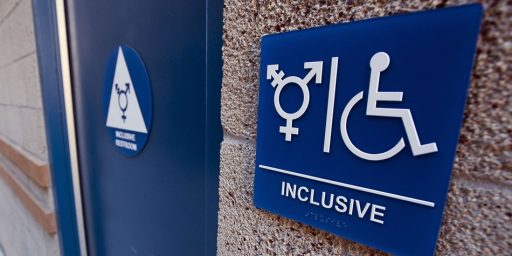
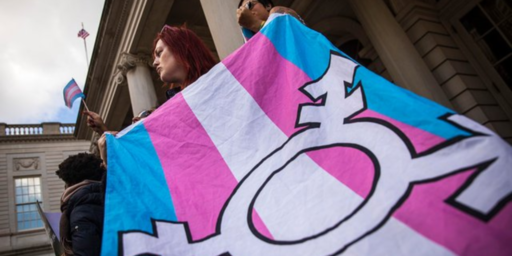
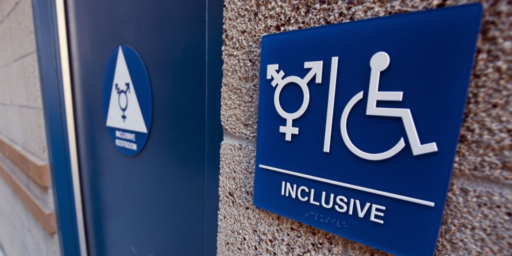
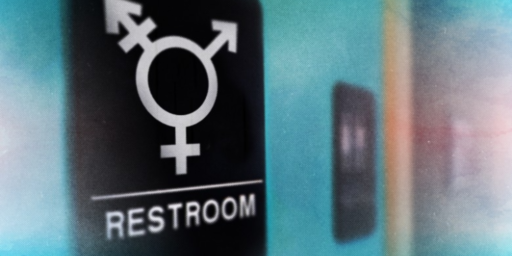

When I was growing up, the word gender was used simply to avoid having to use the word sex. The horror! That old habit seems to be working against us now that we wish to start making important distinctions.
You are just going to see gender-neutral bathrooms in the future buildings, including multi-stall restrooms; many of our private university clients are demanding it.
Even today, in sleepy CT, a lot of local restaurants have bathrooms that are unlabeled, as to gender.
There are the courts, and there is the market. In a lot of ways the market is ahead of the courts on this.
@Daryl and his brother Darryl:
A great deal of the worry over this would go away if Americans simply did as the Europeans generally do, and have toilets behind actual doors, rather than peek-a-boo partitions.
@michael reynolds:
Yup…that’s pretty much where it’s headed.
Ol’ Daniel Craig will be so disappointed when he can’t take a wide stance…
@Daryl and his brother Darryl: James Bond was a US Senator.
@95 South:
yup…I made a mistake…but you knew exactly which member of your perverted cult I was referring to, didn’t you?
I think the major problem we’re seeing is because “transgender” is being used by people who haven’t transitioned yet. Add to that the fact that “being transgender” can now be used as an excuse by someone who wants to get into the opposite sex bathroom/locker room even though said individual hasn’t done anything to demonstrate that it’s in fact a sincerely held belief. Add to that the fact that the population of un-transitioned transgenders is probably much smaller than the number of “false positives” (a.k.a people looking for an excuse).
You just need a few guys using “but I’m mentally transgender!” as an excuse to enter women’s bathrooms/lockers and then sexually harass/assault them—result: the biggest backlash ever.
(And I agree with Mike’s take on it. If we had European-style toilet booths this wouldn’t be that much of a problem.)
@grumpy realist:
Women aren’t all that hard to harass if you’ve a mind to do it. You don’t need to chase them into a bathroom, they’re easily spotted in the wild. The only guy who is going to pull that b.s. will be some right-wing provocateur. Outside of Red America no one gives a damn, and even most of them have grudgingly accepted it. I’d hate to be trans in Mississippi. . . but then again I’d hate to be anything in Mississippi.
@grumpy realist:
I think there are…like…zero incidents of this happening.
I predict the first recorded incident will involve a red-hat.
@Daryl and his brother Darryl: @michael reynolds: …I think you have to have grown up female in the toxic atmosphere of fear of being raped to understand exactly why people-who-look-like-guys walking into the women’s bathroom/locker room is such a no-no.
We’re raised to believe that we have to keep our eyes out at all times for the possibility of being attacked–and if we are, we’re still going to get blamed for not having protected ourselves enough. We tell each other stories: “make sure you hold your keys ready to poke someone’s eyes out when walking to your car after dark.” “Don’t get in an elevator late at night if there’s a guy in there. Take the next car. Just to be safe.”
And then we walk into the woman’s bathroom outside of standard hours and see what looks to be a guy there? You can bet your damn buttons our adrenaline levels are going to go through the ceiling. I had that exact experience finding a man sleeping in the woman’s bathroom late at night–ran out and called the Campus Police. And no, I didn’t worry about whether he was someone who thought he was transgender or just some bum who had wandered in from off the street. I knew I wanted him OUT of there. He was a risk–to me.
That’s what is going to cause the transgender rights cause to finally fall flat on the pavement. As long as it loudly keeps insisting that women have to take on all the increased risk of sexual assault for the sake of transgender “rights” there will at some point be a huge backlash.
@grumpy realist:
The real world risk to a trans female being forced to use the men’s room is greater than the threat from (thus far) purely theoretical threat of fake trans women using a ladies’ room. Trans folk, and gay folk both have reason to fear straight men. If legitimate fear were the criterion we’d need a separate bathroom for gay men. And boys.
Men don’t need subterfuge to attack women in restrooms. If you’re in an empty bathroom the sign on the door won’t cause a rapist to hesitate. And some random attack by someone claiming to be trans won’t kill the movement any more than an attack by a POC would kill civil rights.
@grumpy realist: Funny all my female friends who work at jobs which have universal bathrooms don’t care at all. It’s almost as if the vast majority of people just want to poop/pee and GTFO….
Of course they do get harassed on a nearly daily basis but that’s well outside of the bathroom and is sadly the historical normal stuff…
If a man wants to go into the female bathroom to rape someone they aren’t going to suddenly decide to do so because of transgenders. It’s not like walking into the female restroom today causes a forcefield to pop up to block any male attempting to follow.
Seriously you seem to be arguing that a man can get away with raping a woman simply by declaring they are transgender as they enter the bathroom… It’s weird.
EDIT : You might find it interesting but I follow the same defensive mindset you listed out. I’m also 6’2″ with a solid set of muscles. Almost always when I tell people about this their response is “who the fck would try to mug you”. and I respond with well this one time…..
The biggest meanest badass in the world can still be taken out easily by a surprise attack.
@grumpy realist:
Um. Sleeping in the bathroom?
If I found someone sleeping in the bathroom, or doing push-ups on the floor, or standing naked in front of the mirror doing yoga poses (this one, by the way, I have seen)… I would leave and make sure security knew about it, regardless of their perceived gender.
And, your story shows that you aren’t 100% safe in the bathroom already, and have to be aware of your surroundings for unusual behavior. Transfolk using whichever bathroom is just one of those things you will move from unusual behavior to usual behavior.
If you saw a woman in the bathroom who was acting erratically, what would you do? You aren’t going to shrug and say “well, she’s a woman, so the fact that she’s also completely fvcking insane doesn’t mean anything…” You would get out of there. You might let security know, if they were more than a little unsettling, and you would find another bathroom.
@grumpy realist:
Transgender “rights” are almost as bad as women’s “rights”. Why can’t they just accept their lot in life and not bother me with all their talk about their so-called “rights”?
@Matt: While there are legitimate concerns about the restroom problem that have been mentioned, incidents of that sort are rare. Women know how to take care of some kook coming in and carrying on. Parents should not send a young child in alone.
The hospital has the restrooms that are for anyone; single use.
The family type restrooms have been around for years.
Some of the arenas have huge restrooms. One looked like it has a hundred urinals!
Women generally do not like using the restroom that men use – it’s the wet seat thing.
They are finally building larger public women’s restrooms to eliminate the lines.
One problem area is the dressing/shower rooms at middle and high schools. Most of them were built years ago and do not have private shower stalls.
Parents who have daughters will not tolerate funny business like some guy cross dressing coming in and parading around. Remodeling restrooms is an expense that most schools can’t afford.
I hate these restrooms that are not kept clean. Part of that is up to the patrons. If you use a restroom at places like a restaurant or store, please have the courtesy to flush the toilets and do not leave towels on the floor.
I will have more to say about the restrooms at some other point.
Go to: the The Plumber website for information about plumbing trends, products, and advice about bathrooms. Also, “This Old House” has a lot of plumbing information and interesting reports.
@grumpy realist: As an older female, I must say that your protests and elaborations fall really short. While I haven’t gone to a big event in a stadium for many years, it was routine in my experience in the 1980’s and 1990’s for women to go into the men’s bathrooms at large events because the lines were shorter. I can give you a list of concerts and locations where I used the men’s restrooms just for convenience and time saving. Guys were cool with it.
Maybe you have something else going on that makes you so hostile.
@Tyrell:
For what reason? To here/smell women using the bathroom (eww)? Women don’t strip naked and have orgies in the bathroom. In return for nothing that cross dresser would be endlessly teased and assaulted for being “gay” and “weak”. Anyone with any decent set of social skills can get laid in school anyway. I certainly had no problem finding girls who would get naked with me during that time and I was an idiot when it came to females…
I honestly don’t know a single person who has showered at their school either. The schools I went to still don’t have anything resembling a shower. I’m sure it exists somewhere as there are always exceptions and maybe my schools were the exceptions. It’s not something that I ask people when I meet them so I don’t know.
@michilines: That’s funny because in the late 90s and early 2000s I I witnessed many a woman in the men’s room trying to pee because the women’s restroom had a bigass line. At musical festivals and even some clubs. Drunk people everywhere and none of them were interested in having sex in that cesspool called a bathroom…
At the coffee shop I always go to they have two bathrooms. Single toilet. Locks from the inside. Sorta like a home bathroom. No gender signs.
@Matt: Those are good points. I am thinking back to those PE classes I took where dressing out, doing twenty sit ups, fifty jumping jack’s, four laps around the field, and hit the showers, five minutes to get to the next class way on the other side of the school.
Wearing the gym outfit was required, and showers were appropriate: who wanted a bunch of smelly, sweaty students sitting in class? I had to take PE from 7th. grade through freshman year at college. Wasn’t fun and games either, but I was in shape.
@Tyrell: Everyone had PE in my school too. Standard stuff like you said and no one showered ever. Only changed clothes. In junior high and high school I had to walk or ride a bike for 1.7 miles one way so it wasn’t like PE was the biggest sweaty problem.
kinesiology classes were a requirement in college too and I have no actual idea if there were showers on campus or not as no one ever mentioned it. My classes were scheduled such that I’d go home for a shower and lunch or whatever afterwards.